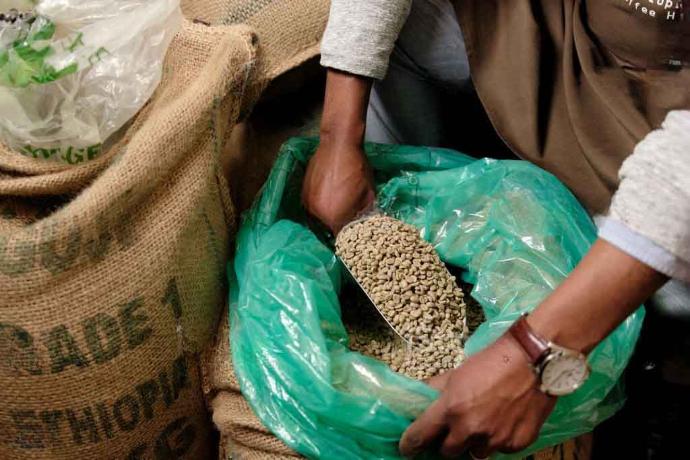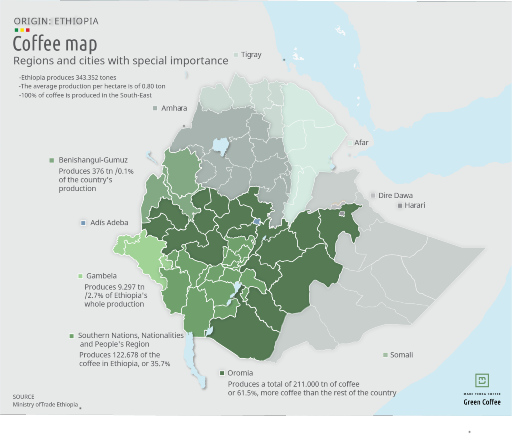Ethiopia Coffee
Ethiopia, the motherland of Coffee, is revered as the cradle of your favorite drink. And rightly so! With approximately 12 million people actively involved in coffee cultivation, the Country boasts such rich coffee culture and tradition like no other nation.
Explore your favorite coffee beans with Solai Coffee today! One sip, that's it! Instant joy!
The cultivation of Ethiopian coffee beans is responsible for generating 60% of the Country's revenue despite having a 3% contribution to the global market. In 2006, Ethiopian coffee exports acquired $350 million, which matches 34% of the total exports made that year. Understanding coffee discovery in Ethiopia is a worthwhile treat for lovers of our favorite drink. Join us as we explore the makings of Ethiopian coffee beans.
 An image showing fresh coffee poured from a Buna Pot for the Ethiopian cultural coffee ceremony.
An image showing fresh coffee poured from a Buna Pot for the Ethiopian cultural coffee ceremony.
Ethiopian Coffee Fun Facts
- The "Coffee Ceremony" is significant to Ethiopia's culture and hospitality.
- Coffee was first discovered in Ethiopia.
- Coffee farming in Ethiopia makes for the 5th largest coffee exporter region in the world
- Coffee is said to hail from the Kaffa-region. Hence, the name.
- Coffee farming in Ethiopia supports about one-quarter of the Country's population directly or indirectly.
History of Coffee in Ethiopia
The discovery of Coffee in Ethiopia is thought to be in the 9th century. Many specialists have declared Ethiopia a region where Coffee bloomed natively, and Kaldi and the coffee legend have cemented the narrative. Kaldi, a goat herder from Keffa, uncovered the coffee plant after noticing the Coffee's energizing results on his goats. Since this discovery, the production of Coffee has become a big part of Ethiopians' everyday life.
Ethiopian Coffee Production
Ethiopia is ranked the world's 7th largest coffee producer and the top producer in Africa's coffee-growing regions. Ethiopian coffee traditions run deep, as they consume half of the Coffee produced in the Country. Notable markets for Ethiopian Coffee exports are the EU (around half the exports), Asia(around a quarter), and North America. Almost all the work, cultivation, and drying are achieved by hand.
Ethiopian coffee exports make up 10% of the government revenue annually. Thus, there are attempts by the government to minimize the coffee industry's part of the GDP by improving the manufacturing department.
 Green coffee beans sourced from Ethiopia
Green coffee beans sourced from EthiopiaClimate for Coffee Cultivation
Coffee in Ethiopia is mainly grown in the southern and southwestern regions of the Country. The coffee plant is climate-sensitive; hence these areas experience a tropical climate ideal for cultivating Ethiopian coffee beans.
The Quality of Ethiopian Coffee Beans
Ethiopian coffee export authorities take the quality of Coffee production very seriously because exporting poor-quality Coffee affects its reputation. Therefore, specific standards and certifications are established on coffee farms exporting coffee beans.
Get more insight on quality and coffee beans profiles here
Ethiopian Coffee Processing Methods
The most common coffee processing methods in Ethiopia are washed and natural processing. The difference is that the cherry is extracted from the bean before or after sun drying.
In natural processing, farmers spread coffee cherries on a leveled surface and then dry the cherries in the sun. This process takes around 2-6 weeks. The seeds are then extracted from the cherry after drying.
Coffee cherries are soaked in a big water bag to ferment in washed processing. Therefore, the cherry softens easily removed from the bean. After this, they are left in the bath for about 12 hours to complete the fermentation process. The beans are then dried in the sun.
 Coffee growing regions in Ethiopia.
Coffee growing regions in Ethiopia.Regional Coffee Varieties
Ethiopia accommodates various coffee types, including wild ones waiting to be documented. Arabica coffee is the most-grown flavor in Ethiopia. Below are varieties of Coffee grown in Ethiopia:
● Sidamo
Sidamo is a trademarked coffee area. It is documented that about 60% of Coffee from here is washed and processed. Coffees from Sidamo are recognized for their full-body, rich, vibrant, crisp acidity and floral and citrus notes.
● Harrar
It's a wild arabica found in the Oromia region. Typically, this Coffee is processed naturally. It is recognized for its extreme fruity acidity and flavor. Harrar Coffee is reported as rich and intense with strong hints of blackberry or blueberry. This Coffee is also heavy-bodied, and its vigor means it's mostly used in espresso blends.
● Limu
Limu Coffee grows in the southwest region of Ethiopia. It is a washed coffee with low acidity consisting of a well-balanced body and a sharp, spicy flavor that is sweet.
● Jimma
The region is a big producer of commercial-grade Coffee. Coffees from this region are great when washed; if it is naturally processed, it takes on a medicinal flavor.
● Yirgacheffe
This region is known for producing exceptional coffees. Most coffees from here are washed and processed, and some are naturally processed. The general Yirgacheffe Coffee is a medium-bodied coffee with an intense floral aroma, exhilarating acidity, and an extended aftertaste.
● Genika
It is an Arabica coffee grown in the Bench Maji Zone in Ethiopia. Genika coffee has a tiny, greyish bean, spicy, chocolate-like taste and aroma.

Roasted three types of Ethiopian coffee beans.
Roasted three types of Ethiopian coffee beans.
Ethiopian Coffee Beans
Ethiopian coffee beans can be divided into three groups: Short berries, long berries, and Mocha. Long-berry varieties comprise the largest beans and are regarded to be of the highest quality in flavor and value. Short-berry varieties are regarded as top-grade beans in Eastern Ethiopia. Mocha varieties are immensely prized products.
To wrap up, Ethiopia, the leading coffee producer in Africa, has had strict regulations to control the coffee industry. In reality, Coffee growing in Ethiopia is but a culture and Solai Coffee is here to explore that culture with you.
Ethiopian Coffee History